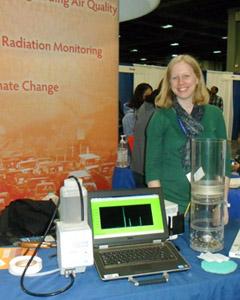Meet EPA Engineer Gayle Hagler, Ph.D.

What's in the air you breathe? Pinpointing the sources of local air pollution can be a real challenge. That's where the work of EPA research environmental engineer Gayle Hagler, Ph.D, comes in.
Gayle helps develop innovative ways to measure air pollution—and where it comes from—through field studies, data analysis and computer modeling. Recently, she has been deeply involved with an EPA research program that develops innovative, next-generation air measurement technologies and also visualizes data on a map. Here are a few links to see projects she has been involved in:
How does your science matter?
I, personally, experience why understanding local air pollution matters: it is something I consider when I think about where my child is in day care, where I live, where my friends live. Air quality affects your long-term and short-term health, how far you can see, and whether the sky is blue. Air quality also affects water quality and ecosystems as air pollution can deposit. Air quality is very important to me, as you can tell!
When I joined EPA, I first focused on trying to measure air pollution in locations that were very close to sources, such as highways and rail yards. I was part of teams asking questions such as – is air pollution very different in these environments? Is there a potential health risk? What are options to reduce air pollution, if there is a concern?
What I found, however, was that measuring air pollution in these environments was very challenging. The pollution levels would often change within just a few hundred feet, so I had to get creative with my measurement approach. I helped to build a mobile air monitoring vehicle, using instruments that could measure every second while driving. This type of measurement challenge also inspired me to get involved in developing smaller and more flexible air quality measurement systems, like a solar-powered air quality bench and a lunch-box sized air quality sampling device.
If you could have dinner with any scientist past or present, who would it be and what would you like to ask them about?
I think the term “scientist” applies to anyone who is pushing the envelope to try to understand how things work, or come up with new inventions. Maybe it's living in North Carolina that makes me think about this, but it would be the Wright brothers. At some point they thought, 'Hey, maybe we could actually fly.' I would like to have dinner with them, they must've been really interesting people and marching to their own drum beat.
For a present day scientist, it is hard to compete with family! My older sister is a pediatric cardiologist and does research projects studying infant heart conditions. Not only do I love every moment I have to spend time with her, I daydream sometimes that it would be so much fun to do a research study together.
What do you like most about your research?
I am wired to be a 'jack-of-all-trades' researcher because I like having a lot of variety in what I do. I enjoy all the variety in air pollution research – my days can include chemistry, physics, meteorology, working hands-on with measurement equipment, and computer programming. I find both the science and the impact of the research very interesting. Most importantly, the point of the research has great meaning to me personally.
When did you first know you wanted to pursue science?
I think I was more of a late-bloomer than most people when it comes to thinking of myself as a scientist or an engineer. Until I was late in high school, I would not have considered myself ever going into a scientific field. My interests mostly ranged from the liberal arts side to music, and I was settling into wanting to be a musician.
One afternoon my high school physics teacher said, 'Wow, you're picking this up a lot faster than you realize, and you might have a knack for this.' That comment was a wake-up call for me. Before I knew it, I was trying to solve my older sister’s college physics homework problems for fun. I think that makes me officially a serious nerd.
Tell us about your science/educational background.
I went to Georgia Institute of Technology (go Yellow Jackets!) in Atlanta. Georgia Tech is a major engineering school and when I started there my major was officially "undecided". After exploring and getting a lot of advice, I ended up in civil and environmental engineering.
I continued on at Georgia Tech in a graduate program in environmental engineering. I ended up focusing my doctorial research on air pollution. My doctoral research was a very good fit for me, as I have a love for adventure. My research ended up leading me to measure air pollution trends in southern China, cross-country skiing up to mountain research station in the Rocky Mountains of Colorado, and two summers camping on the Greenland Ice Sheet. Studying air pollution in all of those environments was a big challenge, and prepared me well for jumping into all different kinds of projects at EPA.
Any advice for students considering a science career?
If you think about almost any sport you have learned, it takes a lot of practice. No one is immediately skilled at soccer when they start, or at baseball or football, or at any sport. It takes years of practice, and it really takes you just liking it and wanting to spend a lot of time doing it.
I think my advice would be to explore many different types of scientific topics, focus on what is interesting and fun, and don't worry so much about whether or not you're good at it. Just keep practicing and have a good time.
Learn more about Gayle's research on the Village Green Project!
Editor's Note: The opinions expressed herein are those of the researcher alone. EPA does not endorse the opinions or positions expressed.
